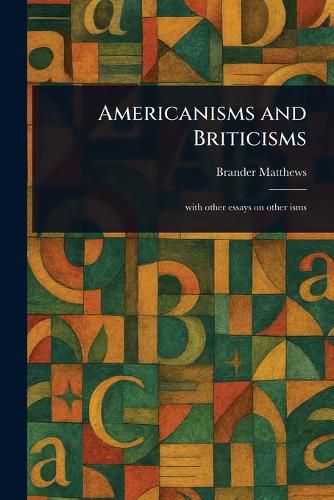Readings Newsletter
Become a Readings Member to make your shopping experience even easier.
Sign in or sign up for free!
You’re not far away from qualifying for FREE standard shipping within Australia
You’ve qualified for FREE standard shipping within Australia
The cart is loading…






This title is printed to order. This book may have been self-published. If so, we cannot guarantee the quality of the content. In the main most books will have gone through the editing process however some may not. We therefore suggest that you be aware of this before ordering this book. If in doubt check either the author or publisher’s details as we are unable to accept any returns unless they are faulty. Please contact us if you have any questions.
Explore the fascinating evolution of language with Brander Matthews' insightful collection, "Americanisms and Briticisms, with other essays on other isms." This compilation delves into the captivating differences between American and British English, examining the origins and usage of distinct words and phrases that define these two major branches of the English language.
Matthews meticulously explores "Americanisms," shedding light on uniquely American expressions and their place in the broader linguistic landscape. Beyond this core focus, the essays venture into other linguistic "isms," offering a wider perspective on the nuances and complexities of language.
A valuable resource for anyone interested in linguistics, style, and the ever-evolving nature of language, this carefully republished edition preserves the original text, offering a glimpse into historical perspectives on the enduring interplay between American and British English. Discover the roots of our shared, yet distinct, linguistic heritage.
This work has been selected by scholars as being culturally important, and is part of the knowledge base of civilization as we know it.
This work is in the public domain in the United States of America, and possibly other nations. Within the United States, you may freely copy and distribute this work, as no entity (individual or corporate) has a copyright on the body of the work.
Scholars believe, and we concur, that this work is important enough to be preserved, reproduced, and made generally available to the public. We appreciate your support of the preservation process, and thank you for being an important part of keeping this knowledge alive and relevant.
$9.00 standard shipping within Australia
FREE standard shipping within Australia for orders over $100.00
Express & International shipping calculated at checkout
This title is printed to order. This book may have been self-published. If so, we cannot guarantee the quality of the content. In the main most books will have gone through the editing process however some may not. We therefore suggest that you be aware of this before ordering this book. If in doubt check either the author or publisher’s details as we are unable to accept any returns unless they are faulty. Please contact us if you have any questions.
Explore the fascinating evolution of language with Brander Matthews' insightful collection, "Americanisms and Briticisms, with other essays on other isms." This compilation delves into the captivating differences between American and British English, examining the origins and usage of distinct words and phrases that define these two major branches of the English language.
Matthews meticulously explores "Americanisms," shedding light on uniquely American expressions and their place in the broader linguistic landscape. Beyond this core focus, the essays venture into other linguistic "isms," offering a wider perspective on the nuances and complexities of language.
A valuable resource for anyone interested in linguistics, style, and the ever-evolving nature of language, this carefully republished edition preserves the original text, offering a glimpse into historical perspectives on the enduring interplay between American and British English. Discover the roots of our shared, yet distinct, linguistic heritage.
This work has been selected by scholars as being culturally important, and is part of the knowledge base of civilization as we know it.
This work is in the public domain in the United States of America, and possibly other nations. Within the United States, you may freely copy and distribute this work, as no entity (individual or corporate) has a copyright on the body of the work.
Scholars believe, and we concur, that this work is important enough to be preserved, reproduced, and made generally available to the public. We appreciate your support of the preservation process, and thank you for being an important part of keeping this knowledge alive and relevant.